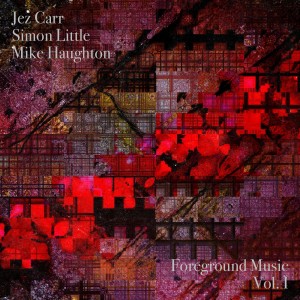
For many the word “improvisation” conjures images of severe and merciless jazz musicians assaulting the audience with discord, disharmony and disrespect. For anyone interested enough in music in itself and how it can be composed and developed, improvisation can be argued to be composition in its purest form. When pianist Jez Carr, saxophonist Mike Haughton and bass player Simon Little came together for a performance they realised that, in the brief time they had to soundcheck, that channels of communication were opening and that a shared musical discourse existed between them. Keen to exploit the possibilities suggested, the trio met again and spontaneously recorded over the course of a day, one hundred and forty minutes of music that had no agenda or pre-existing intent. Remarkable considering that this was only the second time this group of musicians had actually met “Foreground Music Vol.1” is the result of apportioning down that meeting into eight pieces of music that may help the listener, who may be unacquainted with the nature of improvisation and composition, to develop an insight into its potential. Each piece is numbered I-VIII, and, from the opening delicately naive piano phrasing, the willing listener is taken on a journey across a landscape of innocent and intimate engagements. With most of these pieces apportioned seven to thirteen minute episodes, each has the opportunity to build its own character and frame of mind from the opening phrases through to the final accumulation of instrumentation and influences. The overall sensation, after hearing “Foreground Music Vol.1” from beginning to end, is one of contemplative calm, and if the listener is willing to become immersed in each piece, the opportunity for personal reflection and appraisal.
If one needs a comparison to ground
the music here, think of John Surman, Eberhard Weber, Jan Garbarek, Keith
Jarrett and any other number of musicians releasing evocative music on the German
ECM label founded by Manfred Eicher. That is not to say that the music here is
derivative, far from it. It meanders and glances at a wide assortment of
influences and techniques. So often, when discussing improvised music, clichés such
as “telepathy” seem inadequate, and whilst there is an apparent empathy between
the players, there has also been a certain proficiency and perception in
editing these vignettes down to a respectable finished product. So often, in an
era of downloaded music, album cover art work can be overlooked, but special
attention should be given to Simon Little’s
cover which perfectly encapsulates the atmosphere of the music it represents.
As the name “Foreground Music Vol.1”
suggests, this may not be merely considered to be background music that defines
a space in time, but music worthy of specific consideration and scrutiny, and,
hopefully, there may be more to be heard from this session on future releases.
